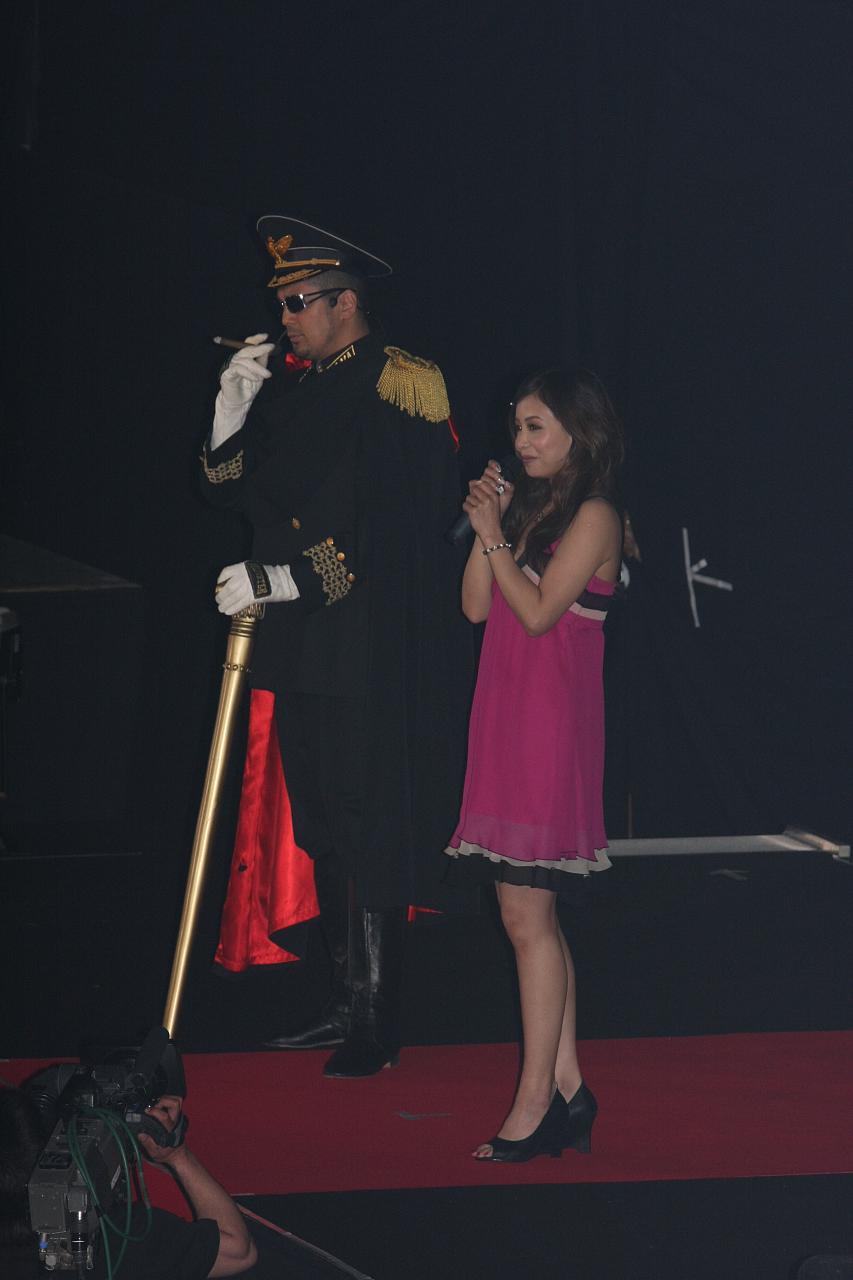|
Yuji Shimada
is a Japanese mixed martial arts and professional wrestling referee, as well as professional wrestling booker, authority figure and occasional wrestler. He has refereed more than 1,000 contests in major MMA promotions including Pride Fighting Championships, Strikeforce, One, M-1 Global, Dream, Deep, Super Fight League and Rizin Fighting Federation. He was formerly the head referee and head of the rules committee for Icon Sport. Biography He started his career in combat sports when he moved to United States to learn catch wrestling after graduating from Toyo University. Shimada trained under Masami Soranaka, Karl Gotch's student and son-in-law, who also taught him the job of refereeing.Yuji Shimada: The Number 1 Third Man Asia MMA After returning to Japan, he started his referee career f ... [...More Info...] [...Related Items...] OR: [Wikipedia] [Google] [Baidu] |
Hustle (professional Wrestling)
was a Japanese professional wrestling promotion managed by Nobuhiko Takada. Hustle can be described as an Industry (economics), industry experiment to market the sports entertainment style of professional wrestling in Japan. History Professional wrestling slang#B, Booked primarily by Nobuhiko Takada and Yuji Shimada, the promotion's basic premise pits the Face (professional wrestling), babyface, or good guy, Hustle faction whose goal is to “defend the industry”, against Generalissimo Takada's Heel (professional wrestling), heel, or bad guy, Monster Faction, whose mission is to destroy the sport. Unlike the traditional puroresu, the company emphasizes melodrama and caricatures over realism and athleticism. The group once maintained a close affiliation with mixed martial arts promoters PRIDE Fighting Championships when both were owned by Dream Stage Entertainment, or DSE. Fans in the U.S. considered HUSTLE to be an answer to Takada's original wrestling style, the serious shoot ... [...More Info...] [...Related Items...] OR: [Wikipedia] [Google] [Baidu] |
Catch Wrestling
Catch wrestling (also known as catch-as-catch-can) is an English wrestling style where wrestlers aim to win by Pin (sport wrestling), pinning or Submission (combat sports), submitting their opponent using any legal holds or techniques. It emphasizes adaptability and seizing opportunities during the match, with fewer restrictions than Styles of wrestling, other wrestling styles - techniques using or targeting the legs are allowed, submissions are allowed, and there are no mandatory grips. It was spread by wrestlers of travelling funfairs who developed their own submission holds, referred to as "hooks" and "stretches", into their wrestling to increase their effectiveness against their opponents, as well as immigrants through Europe and the Anglosphere. Catch-as-catch-can was included in the 1904 Olympic Games and continued through the 1936 Games; it had new rules and weight categories introduced similar to other amateur wrestling styles, and dangerous moves - including all submis ... [...More Info...] [...Related Items...] OR: [Wikipedia] [Google] [Baidu] |
1966 Births
Events January * January 1 – In a coup, Colonel Jean-Bédel Bokassa takes over as military ruler of the Central African Republic, ousting President David Dacko. * January 3 – 1966 Upper Voltan coup d'état: President Maurice Yaméogo is deposed by a military coup in the Republic of Upper Volta (modern-day Burkina Faso). * January 10 ** Pakistani–Indian peace negotiations end successfully with the signing of the Tashkent Declaration, a day before the sudden death of Indian prime minister Lal Bahadur Shastri. ** Georgia House of Representatives, The House of Representatives of the US state of Georgia refuses to allow African-American representative Julian Bond to take his seat, because of his anti-war stance. * January 15 – 1966 Nigerian coup d'état: A bloody military coup is staged in Nigeria, deposing the civilian government and resulting in the death of Prime Minister Abubakar Tafawa Balewa. * January 17 ** The Nigerian coup is overturned by another faction of the ... [...More Info...] [...Related Items...] OR: [Wikipedia] [Google] [Baidu] |
Living People
Purpose: Because living persons may suffer personal harm from inappropriate information, we should watch their articles carefully. By adding an article to this category, it marks them with a notice about sources whenever someone tries to edit them, to remind them of WP:BLP (biographies of living persons) policy that these articles must maintain a neutral point of view, maintain factual accuracy, and be properly sourced. Recent changes to these articles are listed on Special:RecentChangesLinked/Living people. Organization: This category should not be sub-categorized. Entries are generally sorted by family name In many societies, a surname, family name, or last name is the mostly hereditary portion of one's personal name that indicates one's family. It is typically combined with a given name to form the full name of a person, although several give .... Maintenance: Individuals of advanced age (over 90), for whom there has been no new documentation in the last ten ... [...More Info...] [...Related Items...] OR: [Wikipedia] [Google] [Baidu] |
Genichiro Tenryu
, better known as is a Japanese retired professional wrestler and professional wrestling promoter. At age 13, he entered sumo wrestling and stayed there for 13 years, after which he turned to Western-style professional wrestling. "Tenryu" was his ''shikona''. He had two stints with All Japan Pro Wrestling (AJPW), where he spent the majority of his career while also promoting Super World of Sports (SWS), Wrestle Association R (WAR) and Tenryu Project. He is widely considered to be one of the greatest professional wrestlers of all time. At the time of his retirement, professional wrestling journalist and historian Dave Meltzer wrote that "one could make a strong case hat Tenryu wasbetween the fourth and sixth biggest native star" in the history of Japanese professional wrestling. Sumo wrestling career As a sumo wrestler, Tenryu was ranked as a '' sekitori'' for 27 tournaments, 16 of them in the top ''makuuchi'' division. His highest rank was '' maegashira'' 1. Upon the dea ... [...More Info...] [...Related Items...] OR: [Wikipedia] [Google] [Baidu] |
Akira Shoji
Akira Shoji (小路晃) (born January 31, 1974) is a retired Japanese mixed martial arts, mixed martial artist and professional wrestler. He is most known as being a regular in almost all the beginning Pride Fighting Championship Shoji was in Pride 1 to Pride 7, and was part of the first Pride Grand Prix 2000 Opening Round, Pride open weight Grand Prix in 2000. Shoji was consistently a regular in Pride, and moved from Heavyweight to Light Heavyweight (Pride Fighting Championships#Weight classes, Middleweight in Pride) due to his smaller stature. Despite his losing record, Shoji was a constant favourite of the audience, and was nicknamed "Mr. Pride" for his popularity and adherence to the mixed martial arts promotion. He was known for his mic performance, die hard spirit, stellar submission escapes, razor sharp armbar and a fighting spirit demonstrated by his willingness to take on all comers. According to fight commentator Stephen Quadros and John Hyams, director of the documentar ... [...More Info...] [...Related Items...] OR: [Wikipedia] [Google] [Baidu] |
Nobuhiko Takada
Nobuhiko Takada (, ring name: ) (born April 12, 1962) is a Japanese former mixed martial artist, retired professional wrestler, actor, and writer. He competed in New Japan Pro-Wrestling (NJPW), Universal Wrestling Federation (UWF) and the Union of Wrestling Forces International (UWFI) in the 1980s and 1990s, becoming one of the highest figures of the " shoot-style" movement. Takada later turned to mixed martial arts (MMA) where, despite his controversial match fixing ventures and lack of competitive success, he was credited with the existence and development of global MMA promotion Pride Fighting Championships, in which he worked as an executive after his retirement from active competition until its closure. He also founded and starred at the sports entertainment professional wrestling promotion Hustle from 2004 to 2009, and currently works as an executive for the Rizin Fighting Federation. Professional wrestling career New Japan Pro-Wrestling (1981–1984) After training ... [...More Info...] [...Related Items...] OR: [Wikipedia] [Google] [Baidu] |
Yoji Anjo
(born March 28, 1967) is a retired Japanese professional wrestler, mixed martial artist and kickboxer. Anjo is considered to be one of the pioneers of the shoot style movement during the 1980s and early 90s. Professional wrestling career Universal Wrestling Federation and New Japan Pro-Wrestling (1985–1988) A former practitioner of judo, sumo and muay thai, Anjo tried professional wrestling after meeting Nobuhiko Takada. He passed the original Universal Wrestling Federation's entrance tests and had his debut on July 6, 1985, against Osamu Hoshina. He only wrestled a handful of matches for the company, as it collapsed later in the year and its roster moved back to New Japan Pro-Wrestling, where Anjo debuted as a low-ranking member of the UWF "invading" army. Often teaming with fellow shooter Tatsuo Nakano, he feuded with names like Akira Nogami, Osamu Matsuda and Masakatsu Funaki as part of the NJPW junior heavyweight division. He eventually left the company in 1988 follow ... [...More Info...] [...Related Items...] OR: [Wikipedia] [Google] [Baidu] |
Heel (professional Wrestling)
In professional wrestling, a heel (also known as a ''rudo'' in ''lucha libre'') is a wrestler who portrays a villain, "bad guy", "baddie", "evil-doer", or "rulebreaker", and acts as an antagonist to the Face (professional wrestling), faces, who are the heroic protagonist or "good guy" characters. Not everything a heel wrestler does must be villainous: heels need only to be booed or jeered by the audience to be effective characters, although most truly successful heels embrace other aspects of their devious personalities, such as cheating to win or using Glossary of professional wrestling terms#foreign object, foreign objects. "The role of a heel is to get 'heat,' which means spurring the crowd to obstreperous hatred, and generally involves cheating and any other manner of socially unacceptable behavior." To gain Heat (professional wrestling), heat (with boos and jeers from the audience), heels are often portrayed as behaving in an immoral manner by breaking rules or otherwise ta ... [...More Info...] [...Related Items...] OR: [Wikipedia] [Google] [Baidu] |
All Japan Pro Wrestling
(AJPW/AJP) or simply All Japan is a Puroresu, Japanese professional wrestling Professional wrestling promotion, promotion founded on October 21, 1972, by Giant Baba after he left the Japanese Wrestling Association to create his own promotion. Many wrestlers had left with Baba, with many more joining the following year when JWA folded. From the mid-1970s, All Japan was firmly established as the largest promotion in Japan. As the 1990s began, aging stars gave way to a younger generation including Mitsuharu Misawa, Steve Williams (wrestler), "Dr. Death" Steve Williams, Kenta Kobashi, Gary Albright, Toshiaki Kawada, Mike Polchlopek, Mike Barton (Bart Gunn), Akira Taue and Jun Akiyama, leading to perhaps AJPW's most profitable period in the 1990s. In 1999, Giant Baba died and the promotion was run by Motoko Baba. Misawa was named president but left in 2000 after disagreements with Motoko. Misawa created Pro Wrestling Noah and every single native wrestler besides Masanobu Fuchi and Tos ... [...More Info...] [...Related Items...] OR: [Wikipedia] [Google] [Baidu] |
Battlarts
, more commonly referred to as simply Battlarts (also stylized as BattlARTS) was a professional wrestling promotion founded in 1996 by Yuki Ishikawa following the mass exodus he led from Pro Wrestling Fujiwara Gumi (PWFG) amidst the financial struggle that ultimately led the company to fold. The initial promotion's roster was composed of the entire PWFG roster that did not depart for Pancrase, thus making Battlarts a direct successor to PWFG. The promotion ceased operations in 2011, but was succeeded in 2023 by the independent Kakuto Tanteidan project led by Fuminori Abe and Takuya Nomura. History Original Battlarts (1996–2011) The promotion was formed in 1996 by Japanese wrestler Yuki Ishikawa and featured all of the wrestlers from the Fujiwara Gumi promotion, who had abandoned the promotion in favor of Battlarts. They ran shows in the Tokyo area regularly from 1998 to 2002. Even though Battlarts' style was based on shoot wrestling, the promotion often cooperated with oth ... [...More Info...] [...Related Items...] OR: [Wikipedia] [Google] [Baidu] |




